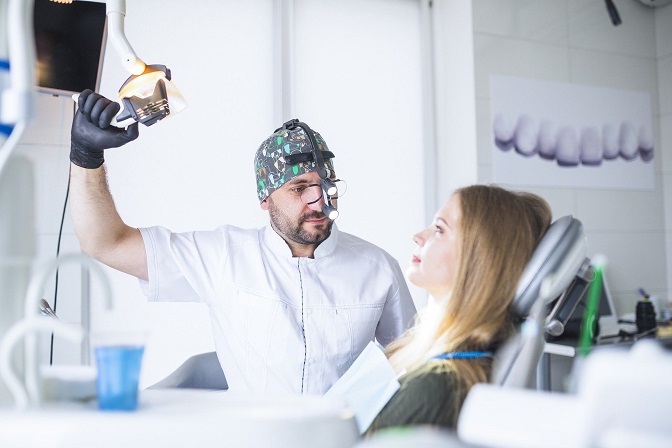
Laser dentistry is the use of lasers to treat various dental problems from cavity removal to gum disease management. Lasers work by delivering energy in the form of light which is then converted to heat energy to remove or alter tissues. They are widely used due to their preciseness and minimal invasiveness. Nevertheless, laser dentistry has its advantages and disadvantages like any technology. Here’s a comprehensive look at what you need to know.
Uses of Laser in Dentistry
Laser has wide range of uses in Dentistry ranging from cavity detection to desensitization. Following are some of the common uses:
1. Cavity Detection and Treatment
Cavity Detection
Lasers are used in detecting early signs of tooth decay. They can identify changes in the tooth structure that may not be visible with traditional methods., allowing for earlier intervention.
Cavity Removal
Lasers can precisely remove decayed tissue from cavities with minimal impact on the surrounding healthy tooth structure. This approach can often be less invasive and more comfortable for patients compared to traditional drilling.
2. Gum Treatment and Soft Tissue Procedures
Gum Disease Treatment
Lasers are effective in treating gum disease by removing infected tissue and promoting healing. They can also help in reshaping gums and reducing pockets where bacteria can accumulate.
Gum Reshaping
For cosmetic purposes, lasers can be used to reshape the gum line, creating a more balanced and aesthetically pleasing smile. This procedure is minimally invasive and often requires less recovery time than traditional methods.
Frenectomy
Lasers can perform frenectomies, which involve removing the frenulum (the small fold of tissue under the tongue or lip) to correct issues like tongue-tie or lip-tie. This procedure is quick and typically less uncomfortable for patients.
3. Teeth Whitening
Lasers are used to enhance the effectiveness of teeth whitening treatments. The laser activates the whitening agent, accelerating the process and often achieving more dramatic results compared to non-laser methods.
4. Oral Surgery
Biopsy and Lesion Removal
Lasers can perform biopsies and remove oral lesions or growths with high precision. The laser minimizes bleeding and promotes faster healing.
Surgical Incisions
For certain oral surgeries, lasers can make precise incisions with minimal bleeding and discomfort. This can be beneficial in procedures such as removing oral tumors or cysts.
5. Pain Management
Laser therapy can be used for pain management in dental procedures. It can reduce inflammation and promote healing, helping to alleviate pain associated with conditions like temporomandibular joint disorder (TMJ).
6. Desensitization
Lasers can help in treating tooth sensitivity by sealing the exposed dentinal tubules, which are responsible for the discomfort caused by hot, cold, or sweet stimuli.
Conclusion
Laser dentistry represents a significant advancement in dental care, offering patients a less invasive, more precise treatment option for various dental procedures. Consult with your dentist to determine the best treatment for your specific needs. By understanding the pros and cons of laser dentistry, you can make an informed decision that supports your overall oral health.
Is laser dentistry painful?
Generally, laser treatments are less painful than traditional procedures. Many procedures require little or no anesthesia and the patients often experience minimal discomfort.
Can laser whiten teeth?
Laser is used to enhance teeth whitening procedures. In teeth whitening procedure, whitening gel is applied to the teeth, laser light activates the gel, speeds the procedure and provides better results.
Can you eat after laser teeth whitening?
It is usually advised to abstain from certain meals and beverages for at least 24 to 48 hours following laser teeth whitening, especially those that can discolor teeth (such as coffee, tea, and red wine). This guarantees the finest possible outcomes from the whitening process and helps prevent discolouration.
Can a laser regrow teeth?
Lasers cannot generate new teeth. They do not, however, rebuild tooth structure, but they can aid in oral health treatments like treating gum disease or improving the efficacy of dental restorations.
Is laser whitening permanent?
Teeth whitening whether with a laser or traditional is not permanent. Teeth discoloration can occur as a result of diet, beverages, smoking, and aging naturally. Periodic treatments may be necessary to maintain teeth in their finest possible condition, although routine touch-ups and good oral care can help preserve the whitening effects.